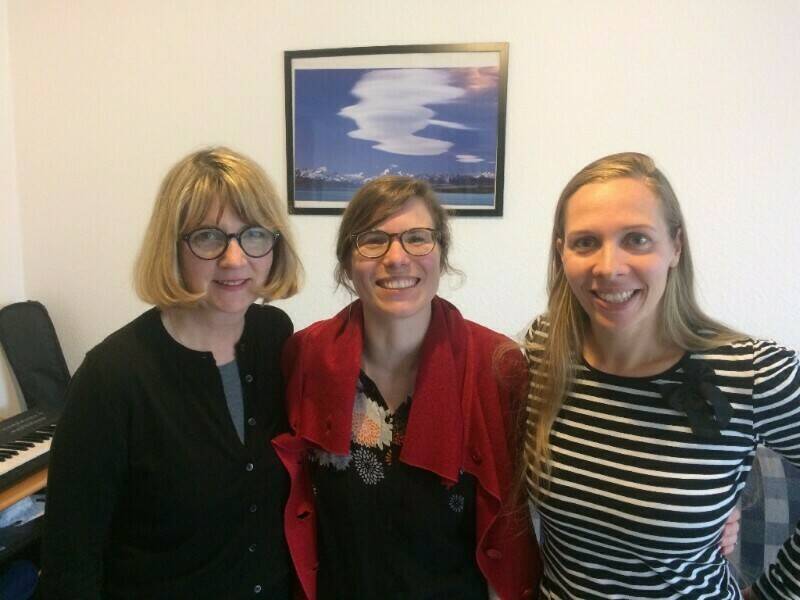Talking climate change and Global Citizenship Education
“Climate action is not only a moral responsibility, it is a necessity for human survival.”
Key Takeaways
This was one of the key takeaway messages Ronja Ievers and Libby Giles took from the 23rd meeting of the Conference of the Parties (COP 23) of the United Nations Framework Convention on Climate Change (UNFCCC) in Bonn, Germany.

The pair received minor grant funding from the New Zealand National Commission for UNESCO to attend the conference, with Ronja attending in week one and Libby in week two. The conference was held under the presidency of the government of Fiji, the first time a small island nation has served in this role.
On Education Day, Libby spoke on a discussion panel Climate Education: Where are We? at the UNESCO pavilion.
“Timely with my discussion on the intersect of climate education, global citizenship education and responsibility was the release of UNESCO’s Declaration of Ethical Principles in Relation to Climate Change (2017),” says Libby. “My work centres on a philosophical approach to future-focused learning with an emphasis on ethics.”
Aside from the activities and events on Education Day, attending COP23 provided further opportunities for networking and partnering in education projects for both participants, such as the Citizen’s Climate Pledge that started in Finland as well as teacher training and internship opportunities with Belgium.
“My experiences in Bonn have consolidated my view that global citizenship education needs to be promoted and developed through strenthening partnerships, not only at governmental level but with non-state actors such as cities, business and civil society,” says Libby.
“In this capacity, America loomed large with its America’s Pledge #WeAreStillIn. State governors, mayors, business leaders and NGOs delivered inspiring and empowering messages to move forward in combating and overcoming the disastrous impacts of climate change. In the words of Governor Jerry Brown of California, ‘The threats are existential but the responses are liberating and enlightening’.”
“We’ve noticed a sea change in thinking since the Paris Agreement – from ‘us and them’ to ‘we’,” says Ronja, “and a shift in the role of education to foster global citizens to promote peace, mutual respect and environmental care.
“This was recognised by young people as an imperative at COP. Their voices were loud and clear, as they demanded better access to information and opportunities to take climate action.”
“It was impressive to see the New Zealand youth delegation at work and to discuss ideas, alongside the minister for climate change and other officials, and to see them challenge practices and processes,” Libby adds.
Recommended reading:
• Give Youth A Chance Campaign – GloCha Youth Empowerment Initiatives – aims to mobilise large scale global philanthropy investment for the empowerment of youth led climate action
• #Decarbonise #Decolonise – a global youth white paper which tells the stories of young people acting as allies in the fight against Climate Change
• Local Communities and Indigenous Peoples Platform – final text was adopted at the end of COP, and is a step towards recognising and respecting the perspectives and knowledge of indigenous peoples that can now be built on.
Ronja went on to attend a symposium on ‘Global Citizenship Education in EFL Teaching’ held in Bergen, Norway on 15 November. This was an opportunity to connect to research and practice of global citizenship in teaching and teacher training.
The symposium was hosted by the research group ‘Researching English Teacher Education, Language and Literature (RETELL)’ at the Western Norway University of Applied Sciences (HVL).
Ronja gave the opening address, with an overview of global citizenship education and experiences of and opportunities for global citizenship education in New Zealand.
“Presentations at the symposium provided a rich understanding of how global citizenship can be fostered through process drama, bilingual education, study of images and eco-critical literature circles to name a few,” says Ronja.
“A key highlight for many in the room was to see evidence of global education in a classroom, which was provided by teachers at the Rothaugen Lower-Secondary School in Bergen. Over the past few years the school has been trialling an approach to making the classroom a truly global classroom through connecting to students, classrooms and individuals worldwide using Facebook, Skype, flipgrid, padlet, Snapchat and other online applications. The main goal is motivating students to take an active part, with teachers putting an emphasis on students learning through discussions with students all over the world.”
Recommended resources:
• Latest virtual reality videos published by the United Nations
• COP in MyCity –an international think-and-do tank dedicated to find student solutions to climate change.
